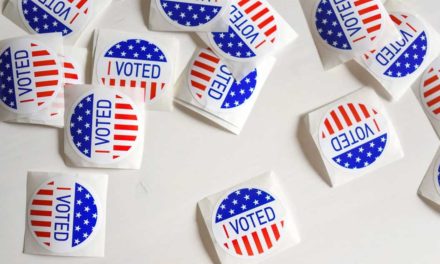America started electing presidents in 1788. George Washington was unanimously elected for the first of his two terms as president, and John Adams became the first vice president.
Ever since then, the loser conceded the win and the winner accepted the concession.
That was pre-Trump. In 2020, the sitting president has apparently decided not to concede. Some fear he will contest the election on the grounds it was rigged—that’s what he says. That’s a national embarrassment but not legally dispositive.
This blog is prompted by the possibility that 2020 will become the first year in which a political election for the US President was held and the loser did not concede. How do we write that? What are the ethics of election concession? What ethical constraints are in place to define it? Explain it? Justify it? Live with it?
The Atlantic Magazine headlined it. “The Election That Could Break America.”[1] The teaser subtitle exclaims, “If the vote is close, Donald Trump could easily throw the election into chaos and subvert the result. Who will stop him?” The inherent uncertainty [If the vote is close], plus the instability of the actor [Donald Trump] added to the expected consequences [chaos and subversion] is a call for action [who will stop him]. This blog is about the writing, not the consequences. None of us can foresee the consequences of a failure to concede the election. But at the very least we should be able to define who, how, when, and what is written about it, from an ethical perspective.
We have a history of conceding the presidential election. The first “concession telegram” occurred when William Jennings Bryan conceded the election of William McKinley two days after the 1896 US presidential election.[2]
Adlai Stevenson lost in 1952 to Dwight D. Eisenhower. He conceded, saying, “Someone asked me how I felt, and I was reminded of a story that a fellow townsman of ours used to tell—Abraham Lincoln. He said he felt like the little boy who had stubbed his toe in the dark. He said that he was too old to cry, but it hurt too much to laugh.”[3]
Richard Nixon lost the 1960 election and immediately said, “My congratulations to Senator Kennedy for his fine race in this campaign.”
Eight years later, Nixon was on the receiving end. Hubert Humphrey said, “Please know that you will have my support in unifying and leading the nation. I’m confident that if constructive leaders in both our parties joined together now, we shall be able to go on with the business of building a better America we all seek in the spirit of peace and harmony.”
In 1976, Jimmy Carter defeated Gerald Ford. Laryngitis prevented him from personally delivering his concession, so Betty Ford, on TV with him looking over her shoulder said, “The president asked me to tell you that he telephoned president-elect Carter a short time ago and congratulated him on his victory.”
Four years later Carter graciously handed the baton to Ronald Reagan, saying, “I have been blessed as only a few people ever have—to help shape the destiny of this nation.”
George H.W. Bush conceded saying, “I want the country to know that our entire administration will work closely with [Clinton’s] team to insure the smooth transition of power. There is important work to be done and America must always come first.”
Al Gore won the popular vote, but George W. Bush went on to win the Electoral College. Gore said, “I say to president-elect Bush that what remains a partisan ranker must now be put aside and may God bless his stewardship of this country.”
John Kerry conceded to President Bush by telephone. “We talked about the danger of division in our country and the need—the desperate need—for unity, for finding common ground, coming together. Today, I hope that we can begin the healing.”
John McCain lost to Barak Obama and conceded saying, “In a contest as long and as painful as this has been, his success alone commands my respect for his ability and perseverance, but that he managed to do so by inspiring the hopes of so many millions of Americans who had once wrongly believed that they had little at stake or little influence in the election of an American president.”
Mitt Romney lost to Barak Obama in 2012. He said, “At a time like this, we can’t risk partisan bickering and political posturing. Our leaders have to reach across the aisle to do the people’s work, and we citizens also have to rise to the occasion.”
Hillary Clinton conceded the day after the election in 2016 saying, “We must accept this result and look toward the future. Donald Trump is going to be our president. We owe him an open mind and the chance to lead.”
This year it will be Donald Trump or Joe Biden’s turn. There is little doubt but that Biden will concede if he loses and will do it publicly and honorably. There is every doubt that Trump will concede, much less do like every Republican or Democrat who has lost the race since 1952.
So the question in this blog is not what Trump does or fails to do. It is how ethical writers must report the once-in-American-history event—a sitting president who loses but refuses to concede to the winner.
Every concession speech is a statement about who won and who lost, but more important a statement about what America stands for. We stand for peaceful and gracious transition of power from one administration to another because we’re a democracy. Every concession speech given confirms that reality. Each was driven by basic courtesy and was made before the winner delivered the requisite acceptance speech.
What makes election day 2020 any different? Donald Trump.
Ethical norms are in place and have been since we became a nation. The US Constitution is chock full of words that writers can use if Donald Trump does what The Atlantic and a few million others think is possible—he won’t concede no matter what. He has conceded nothing, why would he start with his biggest failure so far?
The Atlantic Magazine is blunt. “Something dangerous has hove into view, and the nation is lurching into its path. The danger is not merely that the 2020 election will bring discord. Those who fear something worse take turbulence and controversy for granted. The coronavirus pandemic, a reckless incumbent, a deluge of mail-in ballots, a vandalized Postal Service, a resurgent effort to suppress votes, and a trainload of lawsuits are bearing down on the nation’s creaky electoral machinery.”[4]
As if the nation were blindfolded, hearing impaired, and unconcerned, the article ups the ante. “The worst case, however, is not that Trump rejects the election outcome. The worst case is that he uses his power to prevent a decisive outcome against him. If Trump sheds all restraint, and if his Republican allies play the parts he assigns them, he could obstruct the emergence of a legally unambiguous victory for Biden in the Electoral College and then in Congress. He could prevent the formation of consensus about whether there is any outcome at all. He could seize on that uncertainty to hold on to power.”
On the upside, The Hill’s recent poll sees us as wide-eyed, listening intently, and paying strict attention. “An overwhelming majority of registered voters say it’s important for the losing candidate to concede after election results are known, a new Hill-HarrisX poll finds. Eighty-Two percent of respondents in the Aug. 25-28 survey said they believed conceding was important, while 18 percent said it is unimportant.” The good news in this poll is that only one in five of us think conceding a presidential election is important. The bad news is that anyone thinks that way.
Concession means accepting the reality and the sovereignty of the election. Contesting it means doubting the integrity of the election and ignoring sovereignty. Even in the Florida 2000 debacle, the fight was not about integrity, it was about incompetence. No one said the election was rigged, a hoax, fraud, or unacceptable. It was about hanging chads and partisan counting.[5]
Trump is not arguing about hanging chads; he talking about hanging the vote as juries hang when they can’t decide either guilt or innocence.
Global News reported on September 28, 2020, “U.S. President Donald Trump is doubling down on claims that the upcoming election could be rigged, leading experts to sound the alarm over what could be the country’s first non-peaceful transition of power. Speaking to reporters on Wednesday, Trump would not commit to a peaceful transfer, should he lose to Democratic candidate Joe Biden on Nov. 3. ‘Well we’re going to have to see what happens,’ he said. ‘You know that I’ve been complaining about the ballots, the ballots are a disaster. There won’t be a transfer, frankly, he said. There’ll be a continuation.’”[6]
No transfer? A continuation? We should not take these words seriously because they are his words. They reflect a stream of consciousness, not a prediction. He does not predict; he just projects. That’s the first ethical norm in reporting Trump. Do not petrify readers by giving trust to his words. Report what he does, not what he projects.
The Los Angeles Times reported on September 24, 2020. “No law allows the president to authorize force for domestic use, but Trump’s recent deployment of the National Guard to clear protesters outside the White House has raised concerns about how he would respond to postelection protests. If Biden is certified the winner and Trump refuses to leave office, military commanders would confront a heretofore-unimaginable situation, taking orders from a disputed commander in chief even as his foes look to them to help remove him. A contested election that spills into a fight in state legislatures would trigger constitutional chaos, Foley said. At several points between election day and the inauguration, things can break down if any states opt to disregard their results and Congress can’t agree on how to count the states’ electors.”[7]
If that version of the story becomes the reality and Trump does refuse to leave the White House as the Constitution demands, the press should report what the military does about it, rather than continue to fester about what Trump says. Report the solution, not the refusal. Transparency is an ethical norm; repetition is not.
Law Professor Joshua Geltzer, a former member of President Obama’s National Security Council, was asked for his thoughts on the possibility we end up with a constitutional crisis because Trump refuses to concede the election and will not leave the White House. He said we should think about it like this. “Picture the scene: It’s the morning of November 4, 2020, the morning after the election, and it’s become clear that Donald Trump has lost both in the Electoral College and in the popular vote to the Democratic candidate, Joe Biden. The president, however, rather than calling his Democratic opponent to concede, holds a rally with his supporters at which he declares himself the winner of the election and tells the crowd not to believe what they’re seeing or hearing in the news, because it’s fake news. And he tells them that the election was rigged, it was a deep state coup, and millions and millions of people voted illegally for the Democrats, using fake mail-in ballots. He tells them to take to the streets because their Second Amendment rights are at stake.”
How should the press report this unlikely scenario? Professor Geltzer answered his own hypothetical crisis. “Trump himself made it clear in 2016 he wouldn’t accept the election result. So why would it be any different in 2020? In fact, even after winning in 2016, he’d publicly and falsely claimed that Hillary Clinton had only got more votes than him because “illegals” voted for her. This man is a bad winner; of course he’s going to be a bad loser!”[8]
The most recent comment on this startling possibility comes from the Boston Globe on October 17, 2020. They posed the question as speculative but worrisome. “How important is it that a president on the losing end concede? On the surface, not very. A concession alone holds no legal weight, and should the president lose, he is not obligated to acknowledge that fact in order for his term to end at noon on Jan. 20, as dictated by the Constitution. But Trump’s refusal to clearly commit to this basic norm of electoral civility could enable many unappealing possibilities, experts say, from further inflaming partisan divisions at a volatile time to contributing to an unstable and acrid environment in the weeks after the election while the votes are still being counted and certified.”[9]
Their approach brings another ethical imperative to bear. Focus not on Trump’s words because they violate electoral civility. They further inflame partisan divisions. And they contribute to an unstable and acrid environment while the votes are being counted. Civility, stability, and caring are ethical norms.

I am an author and a part-time lawyer with a focus on ethics and professional discipline. I teach creative writing and ethics to law students at Arizona State University. Read my bio.
If you have an important story you want told, you can commission me to write it for you. Learn how.
[1] Story by Barton Gellman, November 2020 Issue. https://www.theatlantic.com/magazine/archive/2020/11/what-if-trump-refuses-concede/616424/.
[2] Onion, Rebecca (9 November 2016). “When Did Losing Candidates Start Calling the Winner to Concede?” Slate. .
[3] All concession speeches excerpted above were first written in an excellent article by Rosemary Rossi on November 8, 2016 in The Wrap. https://www.thewrap.com/presidential-concession-speeches-nixon-mcgovern-mondale-dukakis-bush-dole-gore-mccain-romney/
[4] Story by Barton Gellman, November 2020 Issue. https://www.theatlantic.com/magazine/archive/2020/11/what-if-trump-refuses-concede/616424/
[5] “In the 2000 United States presidential election, many Florida votes used Votomatic-style punched card ballots where incompletely punched holes resulted in partially punched chads: either a “hanging chad”, where one or more corners were still attached, or a “fat chad” or “pregnant chad”, where all corners were still attached, but an indentation appears to have been made. These votes were not counted by the tabulating machines.” https://en.wikipedia.org/wiki/Chad_(paper)
[6] Hannah Jackson Global News, Updated September 28, 2020 11:30 am. https://globalnews.ca/news/7361353/trump-transition-of-power/
[7] Evan Halper, Eli Stokols, David Savage, September 24, 2020. https://www.latimes.com/politics/story/2020-09-24/if-trump-lost-and-tried-to-hold-onto-power-what-could-he-do
[8] Ibid.
[9] Liz Goodwin, Globe Staff, Updated October 17, 2020. https://www.bostonglobe.com/2020/10/17/nation/what-happens-if-trump-wont-concede/






 I am an author and a part-time lawyer with a focus on ethics and professional discipline. I teach creative writing and ethics to law students at Arizona State University.
I am an author and a part-time lawyer with a focus on ethics and professional discipline. I teach creative writing and ethics to law students at Arizona State University.  My latest novel is Emergence, the sequel to Let’s Disappear.
My latest novel is Emergence, the sequel to Let’s Disappear.  If you have an important story you want told, you can commission me to write it for you.
If you have an important story you want told, you can commission me to write it for you.